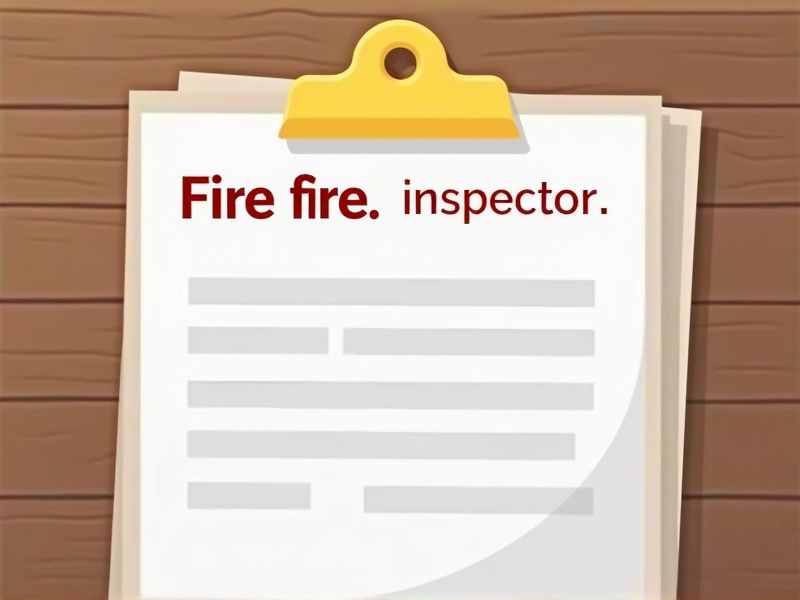
Fire inspectors ensure compliance with safety codes, requiring them to have a deep understanding of fire hazards and prevention methods. Certifications validate this expertise and provide standardized knowledge critical for identifying risks. Regulatory bodies demand these credentials to maintain high safety standards in fire inspection practices. Important certifications for a fire inspector are outlined below.
NFPA Certified Fire Inspector
An NFPA Certified Fire Inspector ensures thorough understanding and application of fire codes, which minimizes the risk of fire-related incidents. This certification validates an inspector's competence, leading to more accurate and reliable safety inspections. With standardized training, certified inspectors can identify and mitigate hazards, contributing to safer community environments. The certification also encourages ongoing professional development, keeping inspectors updated with evolving fire safety standards and technologies.
International Code Council (ICC) Fire Inspector Certification
Obtaining the ICC Fire Inspector Certification ensures that a fire inspector is familiar with the most up-to-date fire safety codes and standards, which directly impacts effective fire prevention and safety practices. This certification validates the inspector's ability to competently assess fire hazards and enforce regulations, leading to improved safety outcomes in both residential and commercial settings. Fire inspectors with this certification are recognized for their expertise, which can enhance their credibility and career opportunities within the field. In regions where building and safety codes are strictly enforced, having this certification can be a requirement, ensuring consistency and compliance in fire inspection processes.
NICET Fire Protection Inspector Certification
NICET Fire Protection Inspector Certification is vital because it standardizes the knowledge required to evaluate fire protection systems effectively. A certified inspector ensures that installations comply with relevant codes, reducing fire risks. Certification enhances credibility and trust in professional assessments, leading to safer environments. It offers career advancement by validating specialized expertise, differentiating individuals in the job market.
NFPA Certified Fire Protection Specialist (CFPS)
The NFPA Certified Fire Protection Specialist (CFPS) credential provides comprehensive knowledge of fire safety practices, which enhances a fire inspector's ability to assess fire hazards accurately. This certification validates an inspector's expertise in applying fire codes and standards, which is crucial for ensuring compliance and enhancing public safety. With CFPS certification, inspectors gain a thorough understanding of risk assessment and mitigation strategies, facilitating more effective prevention initiatives. Employers and regulatory bodies often prefer or require CFPS certification for fire inspectors, as it reflects a commitment to continued education and professional excellence in fire safety.
State Fire Inspector Certification
State Fire Inspector Certification ensures that a fire inspector possesses the necessary knowledge of fire codes and safety regulations. This certification is often mandated to maintain standardized practices across different jurisdictions. It aids in professional accountability, providing assurance that inspections are thorough and comply with state laws. Holding certification can also enhance career opportunities and earning potential for fire inspectors.
Hazardous Materials (HazMat) Technician Certification
Hazardous Materials (HazMat) Technician Certification equips fire inspectors with the expertise to identify and assess risks associated with chemicals. This certification ensures they are prepared to make informed decisions during inspections to enhance public safety. It also provides them with the skills to effectively manage and mitigate hazardous material incidents, reducing potential harm to personnel and property. With certified knowledge, fire inspectors can enforce compliance with safety regulations and guidelines, minimizing environmental and health risks.
OSHA 30-Hour General Industry Safety Certification
Fire inspectors often work in environments with numerous safety hazards, and the OSHA 30-Hour General Industry Safety Certification provides comprehensive training on hazard identification and mitigation. The certification helps ensure fire inspectors are well-versed in occupational safety standards, reducing the likelihood of accidents and increasing safety compliance. By understanding safety protocols thoroughly, fire inspectors can effectively enforce regulations and guidelines, enhancing workplace safety. Employers often prefer certified individuals, recognizing their commitment to maintaining a safe and legally compliant work environment.
Building Code Examiner (BCE) Certification
Building Code Examiner (BCE) Certification equips fire inspectors with a comprehensive understanding of building codes, ensuring that they identify and address potential fire hazards effectively. The certification process reinforces knowledge about fire safety standards, which is critical in preventing potential fire incidents. A fire inspector with BCE Certification is better equipped to collaborate with construction and engineering professionals, leading to more effective enforcement of safety regulations. The certification acts as a formal validation of a fire inspector's expertise, enhancing public trust in their assessments and recommendations.
Certified Emergency Manager (CEM)
A Certified Emergency Manager (CEM) equips a fire inspector with advanced skills in emergency planning and crisis response, enabling them to manage complex emergencies efficiently. Certification ensures that the fire inspector is up-to-date with the latest protocols and strategies, enhancing the safety and preparedness of the communities they serve. The role requires knowledge beyond fire codes, and a CEM designation provides a comprehensive understanding of multi-hazard environments. Being a CEM fosters public trust and ensures that the fire inspector is competent in coordinating with various emergency services and stakeholders.
Advanced Fire and Life Safety Inspection Certification
Advanced Fire and Life Safety Inspection Certification enhances a fire inspector's expertise, leading to more comprehensive safety evaluations. With more stringent codes and evolving technologies, inspectors need up-to-date training to ensure compliance and mitigate risks. Certified inspectors contribute to reducing fire-related incidents through heightened awareness and skills. Organizations and communities benefit from inspectors who can competently identify and rectify potential hazards.
Summary
When you obtain certifications as a fire inspector, your professional credibility and expertise in the field are significantly enhanced. Employers and agencies often prioritize certified inspectors, increasing your job opportunities and potential salary. Certification also ensures you're knowledgeable about the latest fire safety codes and practices, reducing workplace hazards. Through these credentials, community confidence in your inspection services improves, leading to safer environments.
